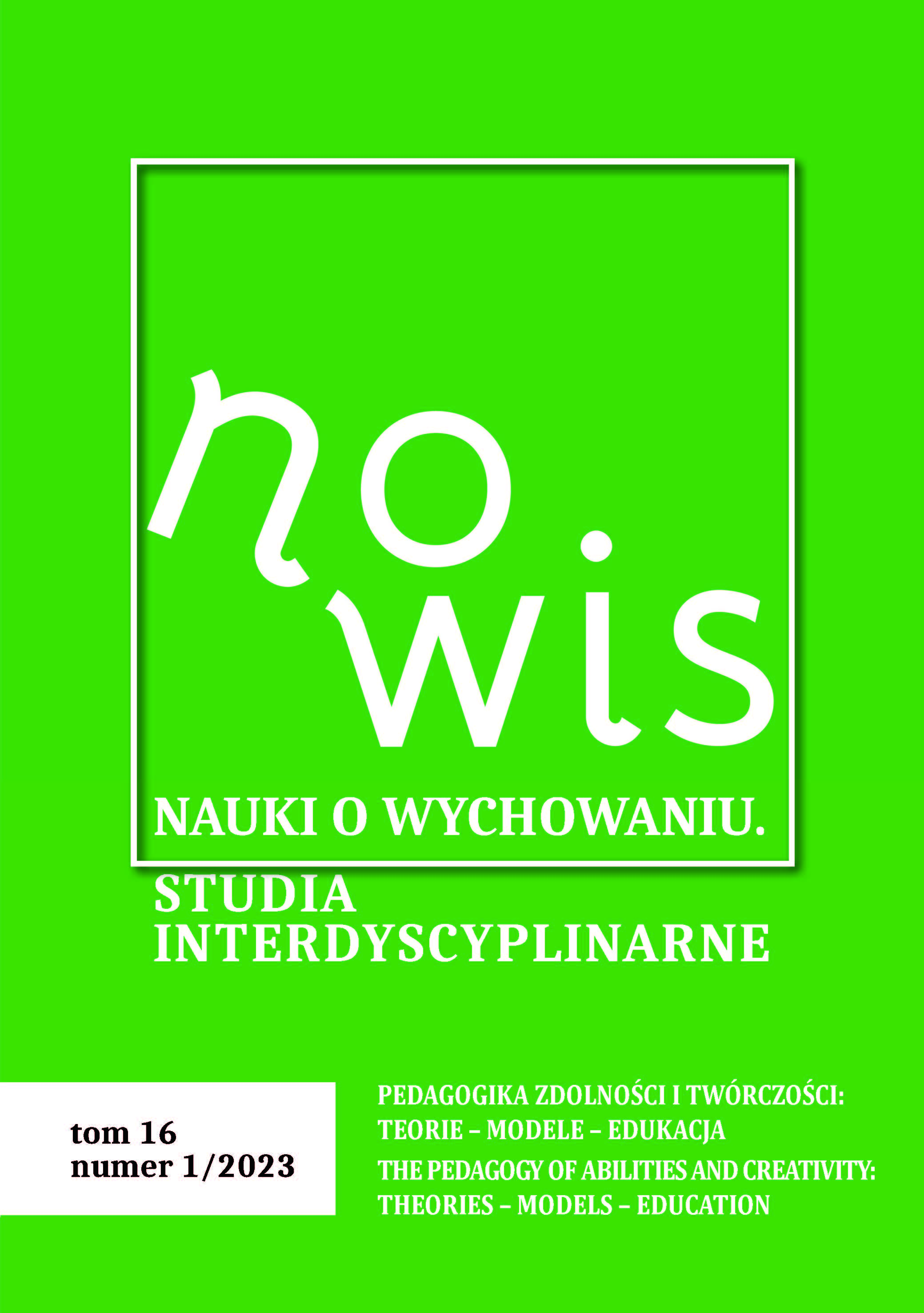The Perception of Gifted Students by Teachers in Grades 1–3 in Poland. Initial Results of Empirical Research
DOI:
https://doi.org/10.18778/2450-4491.16.15Keywords:
paradigms of giftedness, identification of gifted primary grades children, gifted pupils at a younger school ageAbstract
The article presents the preliminary results of an online survey research conducted in May and June 2022 among 484 teachers of initial classes, considered as a convenience sample. The presented results focus on providing evidence: which traits/behaviors of the youngest students are perceived by teachers as markers of giftedness, and whether and how the patterns of identifying students’ abilities differ depending on the professional career of teachers and the characteristics of the schools in which they work. The use of exploratory factor analysis allowed to reveal what latent theoretical concepts of giftedness can be distinguished on the basis of the selection of characteristics of gifted students. The article is inspired by the research conducted by The National Research Center on the Gifted and Talented (Brighton et al. 2007) in 2003, as one of the few studies in this area carried out among primary grades teachers, and revived discussion at the turn of 20th and 21st centuries, primarily in the USA, on changes in the giftedness and gifted education paradigms and the role of teachers in developing skills and talents.
References
Ambrose D., Sternberg R. S. (red.) (2016) Giftedness and Talent in the 21st Century. Adopting to the Turbulance of Globalization, Rotterdam–Boston–Taipei, Sense Publishers, https://doi.org/10.1007/978-94-6300-503-6
Google Scholar
DOI: https://doi.org/10.1007/978-94-6300-503-6
Borland J. H. (2003) The Death of Giftedness w: J. H. Borland (red.) Rethinking Gifted Education, New York, NY, Teachers College Press, s. 105–124.
Google Scholar
Brighton C. M., Moon T. R., Jarvis J. M., Hockett J. A. (2007) Primary Grade Teachers’ Conceptions of Giftedness and Talent: A Case-Based Investigation, Storrs, University of Connecticut, The National Research Center on the Gifted and Talented.
Google Scholar
Callahan C. M., Hertberg-Davis H. L. (red.) (2018) Fundamentals of Gifted Education: Considering Multiple Perspectives, New York, London, Routledge Taylor & Francis Group, https://doi.org/10.4324/9781315639987
Google Scholar
DOI: https://doi.org/10.4324/9781315639987
Cieślikowska J., Limont W. (2010) Obraz ucznia zdolnego w potocznych koncepcjach nauczycieli w: W. Limont, J. Cieślikowska, J. Dreszer (red.) Osobowościowe i środowiskowe uwarunkowania rozwoju ucznia zdolnego, t. 2, Toruń, Wydawnictwo Naukowe Uniwersytetu Mikołaja Kopernika.
Google Scholar
Cuhna F., Heckman J. (2007) The Technology of Skill Formation, Cambridge, MA, National Bureau of Economic Research, [online:] https://www.nber.org/system/files/working_papers/w12840/w12840.pdf (dostęp: 20.09.2022).
Google Scholar
Dai, D. Y., Chen, F. (2014) Paradigms of Gifted Education: A Guide to Theory-Based, Practice-Focused Research, Waco, TX, Prufrock Press.
Google Scholar
Dyrda B. (2012) Edukacyjne wspieranie rozwoju uczniów zdolnych. Studium społeczno-pedagogiczne, Warszawa, Wydawnictwo Akademickie „Żak”.
Google Scholar
Gardner H. (1983) Frames of Mind, New York, NY, Basic Books.
Google Scholar
McCoach D. B, Siegle D. (2007) What Predicts Teachers’ Attitudes Toward the Gifted?, “Gifted Child Quarterly”, nr 3(51), s. 246–255, https://doi.org/10.1177/0016986207302719
Google Scholar
DOI: https://doi.org/10.1177/0016986207302719
Papadopoulos D. (2016) Psycho-Pedagogical and Educational Aspects of Gifted Students, Starting from the Preschool Age; How Can Their Needs Be Best Met?, “Journal of Psychological Abnormalities”, nr 5(2): 153, https://doi.org/10.4172/2471-9900.1000153
Google Scholar
DOI: https://doi.org/10.4172/2471-9900.1000153
Pfeiffer S. I. (red.) (2018) Handbook of Giftedness in Children. Psychoeducational Theory, Research and Best Practices, New York, NY, Springer Cham Publisher.
Google Scholar
Prieto L., Parra J., Ferrándiz C., Sánchez C. (2004) The Role of the Teacher Within the Identification of Gifted Students, paper presented at the European Conference on Educational Research, University of Crete, 22–25 September 2004, [online:] https://www.researchgate.net/publication/323737555_The_role_of_the_teacher_within_the_identification_of_gifted_students (dostęp: 31.08.2022).
Google Scholar
Renzulli J. S. (1986) The Three-Ring Conception of Giftedness: A Developmental Model for Creative Productivity w: Conceptions of Giftedness, Sternberg R. J., Davidson J. E. (red.), Cambridge, Cambridge University Press, s. 53–92.
Google Scholar
Romaniuk W., Jabłonowska M. (red.) (2022) Zdolności i twórczość. Koncepcje. Badania. Praktyka, Warszawa, Wydawnictwo Akademii Pedagogiki Specjalnej im. Marii Grzegorzewskiej.
Google Scholar
Sejm Rzeczypospolitej Polskiej (2021) Obwieszczenie Marszałka Sejmu Rzeczypospolitej Polskiej z dnia 18 maja 2021 r. w sprawie ogłoszenia jednolitego tekstu ustawy – Prawo oświatowe, Dz.U. 2021 poz. 1082.
Google Scholar
Shavinina L. V. (red.) (2009) International Handbook on Giftedness, New York, NY, Springer Science+Business Media B.V., https://doi.org/10.1007/978-1-4020-6162-2
Google Scholar
DOI: https://doi.org/10.1007/978-1-4020-6162-2
Sternberg R. J. (1984) A Contextualist View of the Nature of Intelligence, “International Journal of Psychology”, nr 19(1–4), s. 307–334, https://doi.org/10.1080/00207598408247535
Google Scholar
DOI: https://doi.org/10.1080/00207598408247535
Subotnik R. F., Olszewski-Kubilius P., Worrell F. C. (2011) Rethinking Giftedness and Gifted Education: A Proposed Direction Forward Based on Psychological Science. Psychological science in the public interest, “A Journal of the American Psychological Society”, nr 12(1), s. 3–54, https://doi.org/10.1177/1529100611418056
Google Scholar
DOI: https://doi.org/10.1177/1529100611418056
Knopik T. (2022) [b.t.] w: Edukacja włączająca – Nauka. Rozwój, Przyszłość. Dodatek specjalny do „Rzeczpospolitej” przygotowany we współpracy z Ministerstwem Edukacji i Nauki, 31.05.2022, s. 7 https://edukacjawzasiegureki.pl/wp-content/uploads/2022/06/EW_Dodatek_Rzeczpospolita_31.05.pdf (dostęp: 10.12.2022).
Google Scholar
Kruszyńska E. (2022a) Ankieta: Uczeń zdolny w edukacji wczesnoszkolnej, https://ankiety.uni.lodz.pl/index.php/117472?lang=pl (dostęp: 31.08.2022).
Google Scholar
Kruszyńska E. (2022b) Badanie „Uczeń zdolny w edukacji wczesnoszkolnej”, https://sway.office.com/HxRtcTAUZAvPgZGF (dostęp: 31.08.2022).
Google Scholar
Rada Unii Europejskiej (2018) Council Recommendation of 22 May 2018 on Promoting Common Values, Inclusive Education, and the European Dimension of Teaching (2018/C 195/01), https://eur-lex.europa.eu/legal-content/EN/TXT/?uri=uriserv%3AOJ.C_.2018.19501.0001.01.ENG&toc=OJ%3AC%3A2018%3A195%3AFULL (dostęp: 7.09.2022).
Google Scholar
Zgromadzenie Parlamentarne Rady Europy (ZPRE) (1994) Recommendation 1248: Education for Gifted Children, https://assembly.coe.int/nw/xml/xref/xref-xml2html-en.asp?fileid=15282&lang=en (dostęp: 7.09.2022).
Google Scholar






 The journal's website, created and edited by the NOWiS Editorial Team on the Index Copernicus platform:
The journal's website, created and edited by the NOWiS Editorial Team on the Index Copernicus platform: 





